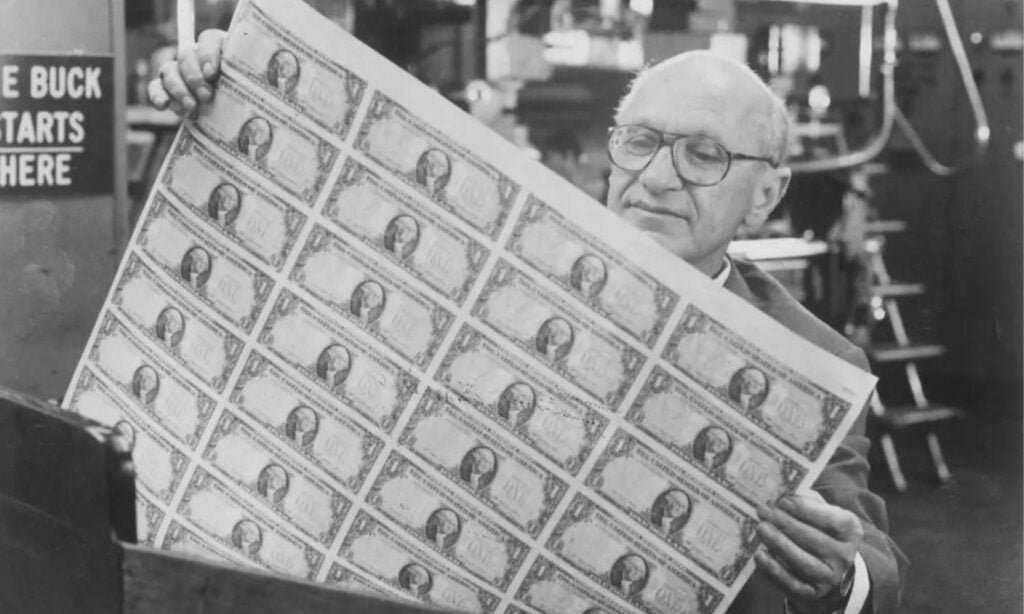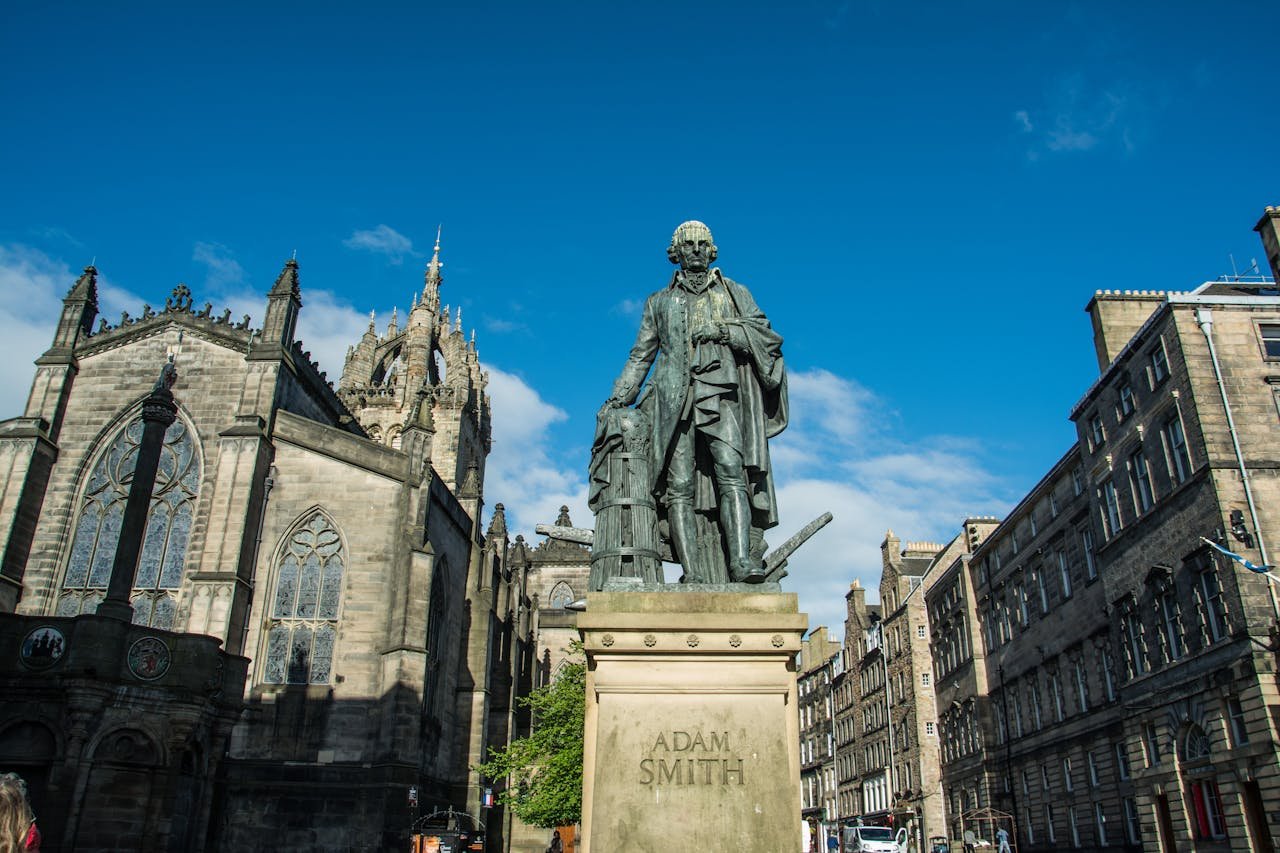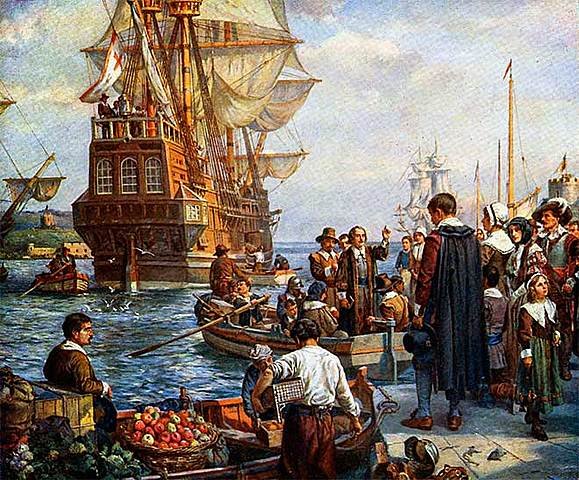Introduction: Presentation of Milton Friedman
Milton Friedman, a prominent name in 20th-century economics, left an indelible mark through his association with the Chicago School and his unwavering advocacy of free market dynamics. Born in 1912, Friedman became an emblematic figure whose thought and work remain relevant and widely studied to this day. Friedman’s influence is especially notable in the area of international trade, where his theories have had a profound impact on global policies and practices.
Throughout his career, Friedman promoted the idea that the free market is the most effective mechanism for ensuring economic prosperity and efficiency. His studies on the quantity theory of money, consumption, and monetary stability not only earned him the Nobel Prize in Economics in 1976 but also cemented his reputation as one of the most ardent defenders of capitalism.
Friedman’s doctrine suggests that minimal government intervention and maximum freedom of trade create more competitive markets and stronger economic systems. These ideas have permeated the realms of international relations and trade policy, influencing trade liberalization and the reduction of tariff barriers in multiple nations. Friedman’s ideology has inspired a series of economic reforms around the world, fostering an environment conducive to economic growth and trade exchange.
Therefore, to fully understand contemporary international trade, it is imperative to examine Milton Friedman’s contributions. His principles and theories not only reshaped U.S. economic policy but also triggered a series of global transformations that persist today. From his advocacy of free markets to his focus on monetarization, Friedman’s teachings continue to guide economists and policymakers in crafting trade strategies and economic policies.
Biography and Context
Milton Friedman, a leading figure in the field of economics, was born on July 31, 1912, in Brooklyn, New York. His academic journey began at Rutgers University, where he graduated in economics in 1932. He later earned a master’s degree from the University of Chicago in 1933 and a Ph.D. from Columbia University in 1946. It was at the University of Chicago that Friedman cemented much of his academic and professional influence, joining the faculty in 1946.

Friedman’s career at the University of Chicago was marked by his association with the so-called «Chicago School,» a group of economists known for their theoretical focus on monetarism and free-market economics. One of Friedman’s most influential mentors during his academic formation was economist Jacob Viner, whose teachings on international trade theory and economic policy left an indelible mark on Friedman’s thinking.
Friedman contributed significantly to various branches of economics, including consumer theory, the permanent income hypothesis, and especially monetarism. The ideas developed at the Chicago School—particularly the defense of free markets and criticism of excessive government intervention—shaped his views on international trade dynamics. This was reflected in his emphasis on the advantages of free competition and open markets, elements he considered fundamental to global economic development.
Friedman’s influence on international trade extended beyond his academic publications; he also had a considerable impact through his advisory work with governments around the world. His proposals for free-market economic policies were adopted by several nations, marking a paradigmatic shift in 20th-century economic thought.
Main Contributions of Milton Friedman to International Trade
Milton Friedman, an iconic figure in modern economics, made important contributions to international trade through his monetarist theory and firm support of flexible exchange rates. His monetarist theory holds that the money supply is a crucial factor in controlling inflation and economic growth. This perspective not only influenced domestic policies in many countries but also had significant implications for global trade. Friedman argued that stable and predictable control of the money supply could create favorable conditions for international trade, facilitating greater predictability and efficiency in commercial transactions between nations.
Another of his fundamental contributions was his defense of flexible exchange rates. Unlike the fixed exchange rate systems that had prevailed before, Friedman advocated for a system where currency values are determined by the market. According to him, this would allow for better adaptation to external economic shocks and a faster and more efficient adjustment to trade imbalances. The interaction of currency values based on supply and demand, Friedman argued, could benefit international trade by eliminating many of the rigidities and distortions introduced by fixed exchange systems.
Friedman was also an unwavering advocate of free trade, often arguing that trade barriers and protectionism distort markets and create significant economic inefficiencies. For Friedman, protectionist policies not only harm consumers by reducing the variety of available products and raising prices, but also negatively impact producers by limiting access to foreign markets. He argued that free trade allows countries to specialize in the production of goods and services in which they have a comparative advantage, thereby promoting a more efficient allocation of resources and greater global economic prosperity.
Monetarist Theory and Its Application to International Trade
The monetarist theory, a prominent economic approach popularized by economist Milton Friedman, has had a significant influence on global economic policy. Its core principles focus on the control of the money supply as the primary tool for regulating the economy. Friedman argued that, through strict control of the amount of money in circulation, long-term economic stability could be achieved without the need for significant state intervention.
One of the key principles of Friedman’s monetarist theory is his defense of flexible exchange rates. According to this approach, exchange rates should be determined by market forces without government interference. This contrasts with fixed exchange rate regimes, where governments directly intervene in currency markets to maintain exchange rates at a desired level. Flexible rates, according to Friedman, allow national economies to adapt more quickly and efficiently to changes in global economic conditions.
The application of this idea to international trade suggests that allowing currencies to fluctuate freely can help balance countries’ payments accounts. This is achieved through automatic adjustments in the supply and demand of foreign currency, which can stabilize international trade and promote more sustainable economic growth. In addition, flexible exchange markets reduce the need for large foreign currency reserves by central banks, freeing up resources that can be channeled into productive investments.
The impact of Friedman’s ideas on international trade is also evident in his criticism of capital controls and tariffs. He argued that such barriers distort markets and create inefficiencies. Instead, he promoted a free trade system, where nations trade without unnecessary restrictions, allowing markets to self-adjust and optimize the allocation of global resources. The adoption of these monetarist principles has had profound implications, leading to greater trade liberalization and international economic cooperation.
Defense of Free Trade
Milton Friedman, one of the most influential economists of the 20th century, was a strong advocate of free trade. According to Friedman, free trade is a key driver of global economic efficiency. He argued that when trade borders are liberalized, markets can operate more efficiently, allocating resources to the areas where they are most productively used. This efficiency, according to Friedman, not only benefits individual countries but also promotes global prosperity.
Friedman maintained that government intervention in markets often causes economic distortions. Such interferences—in the form of tariffs, quotas, and subsidies—alter the prices of goods and services and disincentivize efficient production. For Friedman, international competition is crucial to keeping pressure on domestic companies to be innovative and efficient. His categorical rejection of state intervention was based on the belief that free markets lead to resource allocation that maximizes global welfare.
In his policy proposals, Friedman advocated for the elimination of trade barriers and the reduction of government controls. He believed that a free and open trade system allows consumers access to quality goods and services at competitive prices while fostering economic growth. Friedman’s economic policy reflects a belief in market self-regulation and skepticism toward the government’s ability to effectively manage the economy.
Friedman’s influence on international trade is evident in how many countries adopted free market policies starting in the 1980s. These policies, rooted in Friedman’s philosophy, have been fundamental in driving globalization and the increase in the flow of goods, capital, and services across borders. In short, Milton Friedman’s defense of free trade centers on the belief that open and competitive markets are essential for economic prosperity.

Criticism of Protectionism
Milton Friedman, one of the most influential economists of the 20th century, was a staunch opponent of protectionism. According to Friedman, trade barriers such as tariffs and import quotas create significant distortions in markets. In his view, these barriers negatively affect both consumers and producers. For consumers, protectionism leads to higher prices for imported goods, reducing their purchasing power and limiting access to better quality or more affordable products.
Friedman argued that protectionism creates an artificial market environment, where domestic products, shielded from external competition, have no incentive to improve efficiency or innovate. As a result, these products tend to be more expensive and of lower quality compared to those produced in a free trade environment. Moreover, the increase in prices not only impacts individual consumers but can also affect the overall economy by reducing aggregate demand.
On the other hand, for producers, trade barriers limit access to international markets, restricting their opportunities for growth and expansion. Friedman emphasized that in a globalized economy, the prosperity of businesses depends largely on their ability to compete in an open and dynamic international market. By limiting this capacity, protectionism restricts efficiency and competitiveness, which in the long term can result in lower job creation and a less robust and diversified national economy.

Global Impact and Legacy
Milton Friedman’s ideas have had a significant impact on the formulation of international trade policies, especially in the United States and other nations during the late 20th century. Friedman’s fervent defense of free markets and his skepticism toward government intervention resonated widely among policymakers and economists of the era. The theory of monetarism, one of his most influential contributions, emphasized the importance of controlling the money supply to enable stable economic growth, which directly influenced global economic policies.
In the United States, Friedman’s principles were fundamental during Ronald Reagan’s administration, influencing deregulation and free-market policies that characterized that era. Beyond U.S. borders, his theories found an echo in leaders such as Margaret Thatcher in the United Kingdom, who also adopted a firm approach to monetarism and free-market policies, thus transforming the British economy.
Renowned economists and thinkers have been influenced by Friedman’s ideas. Among them are figures such as Alan Greenspan, who, as chairman of the U.S. Federal Reserve, implemented policies that reflected Friedman’s philosophy. Also notable are the works of economists like Gary Becker and Thomas Sowell, whose studies and publications continue to promote the market economy principles initially advanced by Friedman.
Even today, Friedman’s theories continue to resonate in debates on international trade. His insistence on the superiority of free markets in fostering competition and innovation remains a reference point in current discussions about globalization and trade policies. Milton Friedman’s legacy in the context of international trade is tangible, as his ideas continue to shape how nations approach the global economy in an interconnected world.
Criticisms and Debates
Milton Friedman’s ideas on the free market have been the subject of various criticisms and controversies, especially in the context of international trade. Although many have praised his emphasis on economic freedom and the effectiveness of free markets, others argue that his vision is too idealistic and does not always translate into positive results for all stakeholders. One of the most controversial points is his stance on minimal government intervention, which, according to critics, can exacerbate economic inequalities and undermine social stability.
In the current debate, marked by a resurgence of populism and protectionism, Friedman’s ideas remain a reference point for both defenders and critics of free trade. Those who support economic globalization argue that policies based on Friedman’s principles foster efficiency, reduce costs, and facilitate innovation. However, opponents contend that such policies can also lead to job outsourcing and unfair competition that harms domestic industries.
Another aspect worthy of debate is the perception that international trade driven by Friedman’s ideas disproportionately benefits large corporations and developed economies, leaving behind developing countries. This criticism has gained traction in recent years, given the growing demand for fairer and more equitable trade. The rise of protectionism in various parts of the world reflects this concern and the desire to prioritize local economies over global ones.
Despite the controversies, Friedman’s influence on international trade is undeniable. His ideas remain a central component of the economic debate and serve as a starting point for any serious discussion on the advantages and disadvantages of free markets in an increasingly interconnected world. Whether one agrees or disagrees, Friedman’s theory remains vital to understanding the challenges and opportunities of international trade in today’s context.
References
- Friedman, Milton. Capitalism and Freedom. University of Chicago Press, 1962.
- Friedman, Milton, y Rose Friedman. Free to Choose: A Personal Statement. Harcourt Brace Jovanovich, 1980.
- Friedman, Milton. Essays in Positive Economics. University of Chicago Press, 1953.
- Friedman, Milton. «The Case for Flexible Exchange Rates.» Essays in Positive Economics, University of Chicago Press, 1953, pp. 157-203.
- Friedman, Milton. «Trade with Fixed and Flexible Exchange Rates.» The Journal of Political Economy, vol. 60, no. 5, 1952, pp. 413-435.
- Viner, Jacob. Studies in the Theory of International Trade. Harper & Brothers, 1937.
- Johnson, Harry G. «Milton Friedman’s Monetary Framework: A Debate with His Critics.» Journal of Political Economy, vol. 83, no. 5, 1975, pp. 999-1012.
- Meltzer, Allan H. Milton Friedman: A Biography. University of Chicago Press, 2004.
- Bordo, Michael D., y Anna J. Schwartz. «From the Exchange Stabilization Fund to the International Monetary Fund.» Political Economy of International Money, Macmillan Press, 1997.
- Posner, Richard A. The Chicago School of Antitrust Analysis. University of Chicago Law Review, 1979.



Pingback: Tipos de Cambio y su Impacto en el Comercio Internacional
Pingback: Friedrich Hayek: Un pilar del libre mercado